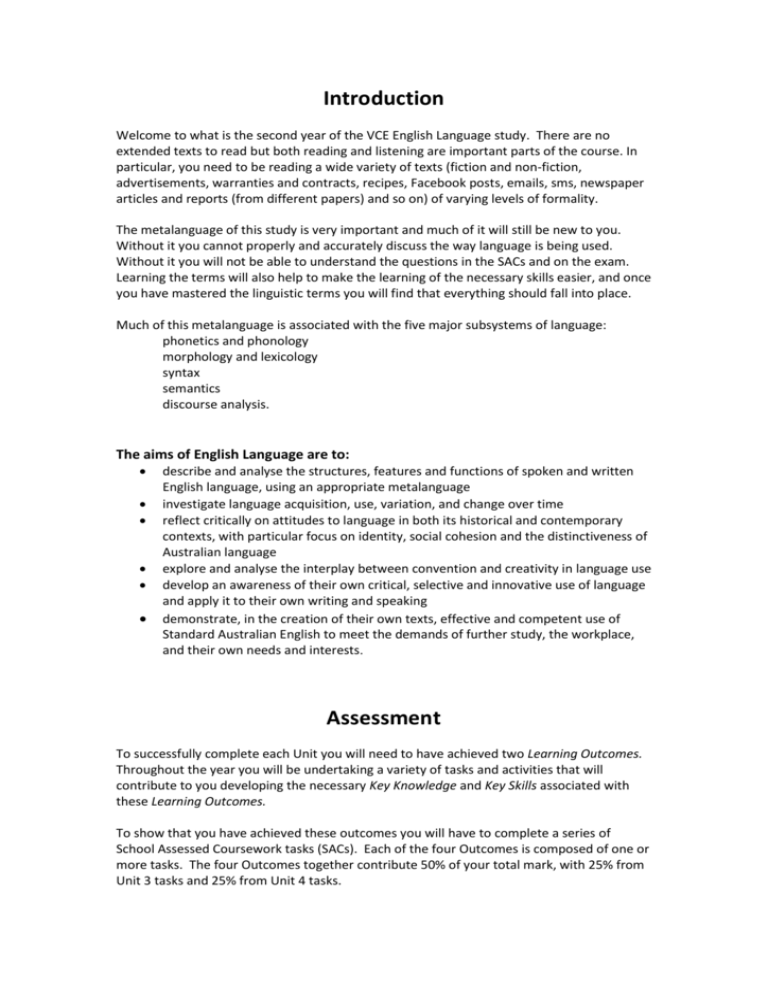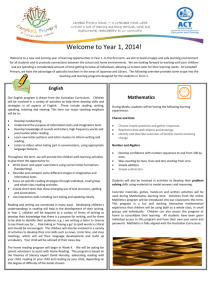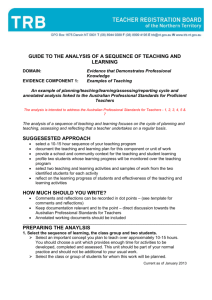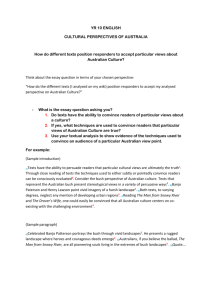1061 - Ballarat High School
advertisement

Introduction Welcome to what is the second year of the VCE English Language study. There are no extended texts to read but both reading and listening are important parts of the course. In particular, you need to be reading a wide variety of texts (fiction and non-fiction, advertisements, warranties and contracts, recipes, Facebook posts, emails, sms, newspaper articles and reports (from different papers) and so on) of varying levels of formality. The metalanguage of this study is very important and much of it will still be new to you. Without it you cannot properly and accurately discuss the way language is being used. Without it you will not be able to understand the questions in the SACs and on the exam. Learning the terms will also help to make the learning of the necessary skills easier, and once you have mastered the linguistic terms you will find that everything should fall into place. Much of this metalanguage is associated with the five major subsystems of language: phonetics and phonology morphology and lexicology syntax semantics discourse analysis. The aims of English Language are to: describe and analyse the structures, features and functions of spoken and written English language, using an appropriate metalanguage investigate language acquisition, use, variation, and change over time reflect critically on attitudes to language in both its historical and contemporary contexts, with particular focus on identity, social cohesion and the distinctiveness of Australian language explore and analyse the interplay between convention and creativity in language use develop an awareness of their own critical, selective and innovative use of language and apply it to their own writing and speaking demonstrate, in the creation of their own texts, effective and competent use of Standard Australian English to meet the demands of further study, the workplace, and their own needs and interests. Assessment To successfully complete each Unit you will need to have achieved two Learning Outcomes. Throughout the year you will be undertaking a variety of tasks and activities that will contribute to you developing the necessary Key Knowledge and Key Skills associated with these Learning Outcomes. To show that you have achieved these outcomes you will have to complete a series of School Assessed Coursework tasks (SACs). Each of the four Outcomes is composed of one or more tasks. The four Outcomes together contribute 50% of your total mark, with 25% from Unit 3 tasks and 25% from Unit 4 tasks. There is a two-hour examination at the end of the year for English Language and this will provide the benchmark against which your School Assessed Tasks will be statistically moderated. The examination contributes 50% of your overall mark. The examination will contain a series of short answer questions, an extended analysis and an essay. In order to achieve a high score you will also have to be able to incorporate some content which does not come from the set text/s but which displays your wider reading and listening in English. The emphasis is upon higher order thinking skills, about not simply recognising something but being able to analyse it, discuss how it functions or why it might be present. Area of Study Unit 3 – Language variation and social purpose The focus of this unit is language in its social setting, looking at how we communicate information, ideas, attitudes, prejudices and beliefs through language, along a continuum of informal and formal texts. This unit considers language as a means of societal interaction and students consider how texts are influenced by the situational and cultural contexts in which they occur. Students also learn how language use and choices can be indicative of relationships, power structures and purpose, including the fact that language is used as a means of control and inclusion or exclusion. Outcome One – Informal language On completion of this unit the student should be able to identify and analyse distinctive features of informal language in written and spoken texts. Outcome Two – Formal language On completion of this unit the student should be able to identify and analyse distinctive features of formal language in written and spoken texts. Area of Study Unit 4 – Language variation and identity In this unit students focus on the role of language in establishing and challenging different identities. Many varieties of English exist in contemporary Australian society, including national, regional, cultural and social variations. Standard Australian English is the variety that is granted prestige in contemporary Australian society and it has a role in establishing national identity. However, non-Standard varieties also play a role in constructing users’ social and cultural identities. Outcome One – Language variation in Australian society On completion of this unit the student should be able to investigate and analyse varieties of Australian English and attitudes towards them. Outcome Two – Individual and group identities On completion of this unit the student should be able to analyse how people’s choice of language reflects and constructs their identities. Study Design The Study Design can be downloaded from VCAA’s website. The material above is a brief summary of Units 3 & 4, taken from the Study Design. You should ensure you have a copy of the Study Design and refer to it over the course of the year. The new design has specific metalanguage pages (22-23) that can be a checklist for you to ensure you can use all the relevant terminology. Weekly homework/work requirements General activities Each week there will be set activities and readings chosen from the assigned textbook and a variety of handouts and readings from the Internet. These are designed to give you practice working with terminology, identifying particular items of interest and writing appropriately about them. Glossary You will buy an extensive glossary of the key terms and concepts at the beginning of next year but would profit from making a series of flash cards of your own to help you learn and revise the terms thoroughly on an on-going basis. Each card should have the word, the definition and an example which you understand. Correct spelling of relevant terms is essential if you hope to do well. Scrapbook A major focus of this subject is the way English is used today and so you cannot rely on dated print materials alone. You need to become aware of the way English is used around you, both in spoken and written forms. As you read the papers, skim through magazines, surf the net and listen to radio and TV, you will quite often come across articles or stories that either: *discuss ways in which language use is changing *are really good examples of a particular kind of language use. It’s time to start collecting them. This task is designed to get you thinking about different aspects of language as you read for pleasure and information throughout the year. Essay writing and analysis task As stated earlier in the section on assessment you have to write essays and extended analyses in this subject. To help prepare you for this task you will be required to write increasingly extended pieces during the year, both as homework activities and as parts of SACs. Part of your independent study time over the year must be dedicated to writing practice and giving them to me for feedback. I will remind you of the need for practice pieces from time to time, but ultimately it is your responsibility to ensure this is done. Textbook and other useful resources Set Texts Living Lingo, 2011 Ed. Burridge, Clyne & De Laps VATE This is the required text for all students. It is the most recently published textbook for our subject, and it has been revised for the 2012 Study Design. English Language Exam Guide, Kirsten Fox, Insight This has been revised for the 2012-2016 Study Design and contains useful activities, essay tips and more. Excel Grammar Handbook, Phil Walker, Pascal Press This is a comprehensive guide to grammar. This subject requires a systematic understanding of grammar. This book provides you with definitions and activities for you to complete. Other books of interest This subject requires you to read beyond the set texts, and to demonstrate this reading in your assessment, including on the final exam. Below is a list of books to get you started, but it is by no means a definitive list. The school library has a stand which contains the English Language collection. These books can be borrowed but must be returned quickly as copies are limited Mother Tongue, Bill Bryson Bryson has written many travel books and books on language. This is an especially interesting read if you are interested in the development and use of the English language. How Language Works, David Crystal This is a fairly short and accessible book by an author and student of language who has written many books about language The Cambridge Encyclopaedia of the English Language, David Crystal –This provides considerable depth in many areas of language study. Rediscover Grammar, David Crystal A useful text for understanding English Grammar Mastering Advanced English Language, Sara Thorne Some schools use this as a text but it is at a very advanced level and contains much more information than you will need. Occasionally I will use an exercise from this text to help you. Australian Accents, Anne Mancini This is probably out of print now but it does have sections on most of the areas dealt with in the English Language curriculum. Living Language, George Keith and John Shuttleworth This is an English text, not Australian. There are many sections which are useful and I use some of them with you during the Year 12 course. Speaking Our Language, (The Story of Australian English), Bruce Moore This book focuses on the development over time of English in Australia. Although relevant it is quite dry in its presentation. Eats, Shoots and Leaves, Lynne Truss This book which focuses on punctuation as a tool in helping clarify meaning. The Fight for English, David Crystal Takes a historical view to why we’re obsessed with punctuation and its decline. Crystal says in his intro that his book is, in part, a response to Lynne Truss’ Eats, Shoots and Leaves and other style manuals. He takes a different approach to Truss and those obsessed by English usage.







